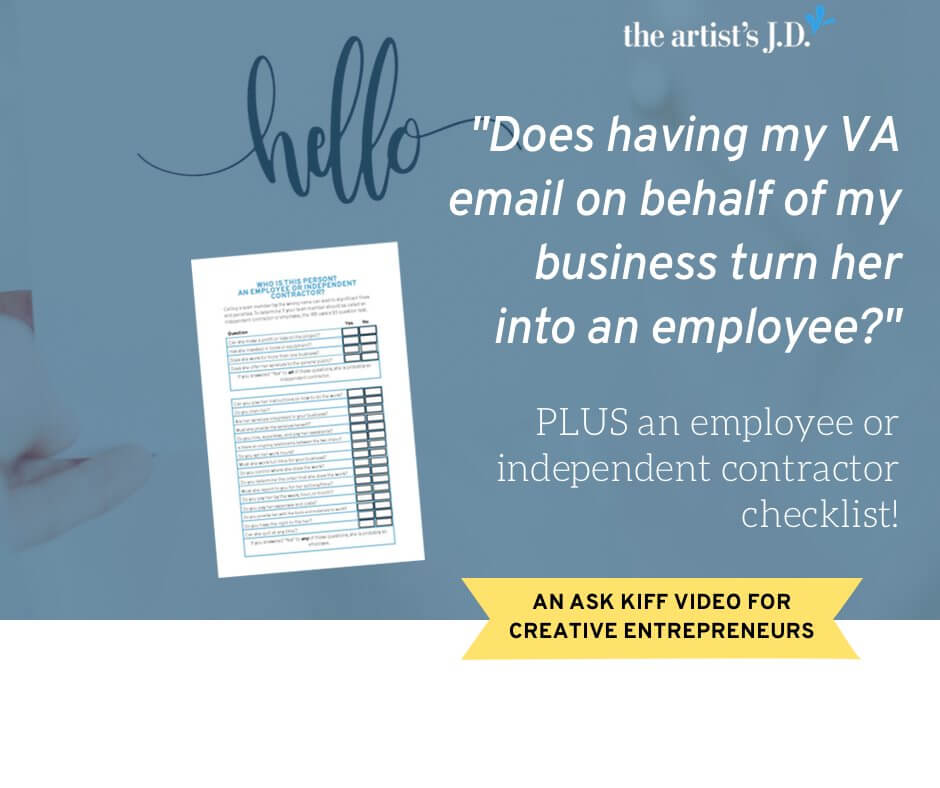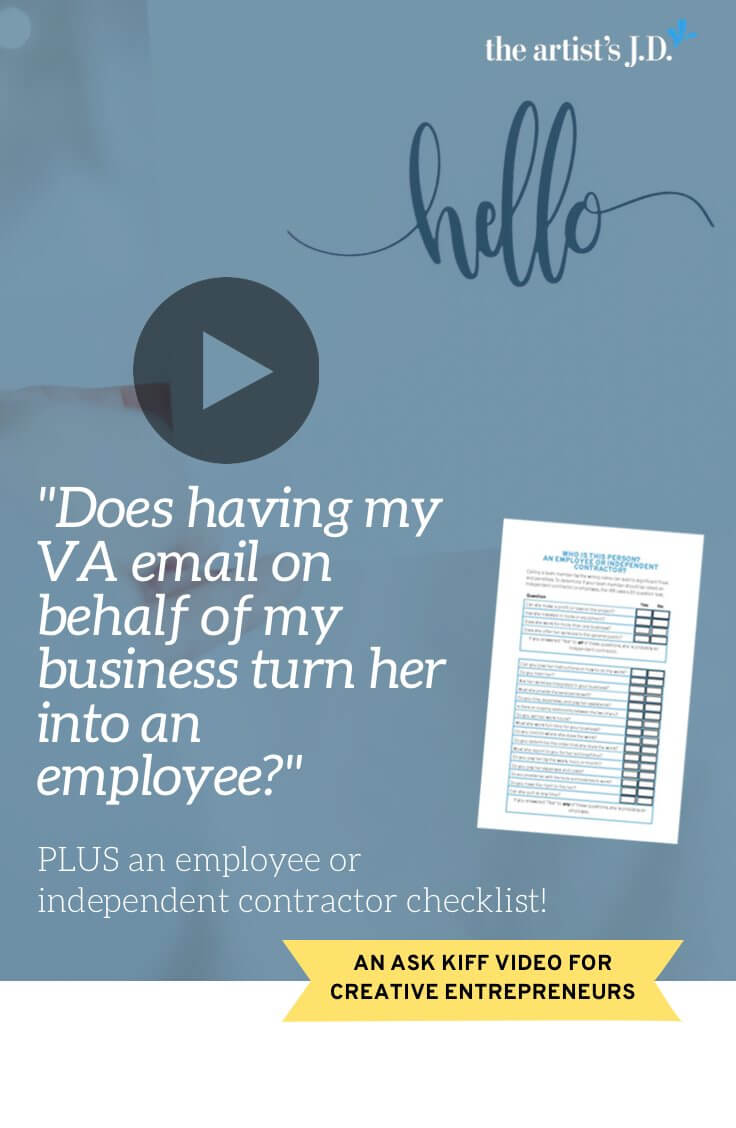Want to tame your inbox by delegating it to your virtual assistant? Would you like them to answer emails, book appointments, or respond to customer requests?
Then you won’t want to miss this week’s episode of Ask Kiff.
Watch the video | Read the show notes | Read the transcript
Show notes
- Read this post giving seven different examples of when team members are employees and when they can be independent contractors
- Have a California-based VA? Then you’ll want to understand what tasks you can and can’t assign her without making her an employee. There’s a workshop available in the artist’s Courtyard to help you decide.
- In this post, learn what three things you need to collect when hiring an independent contractor
- Have to hire an employee? Learn the exact steps you’ll need to take to hire one
- Leave a question or sign up to vote on future episodes here

What name should you give your team member?
Don’t call your new team member by the wrong name!
Enter your email to download a workbook that will walk you through the questions you need to answer to decide if they can be an independent contractor. Or if you’ll have to hire them as an employee.
Your privacy is important to us. Learn how we protect it here.
Transcript
If you’re like the majority of creative business owners your inbox has a thousand unread emails in it.
And that gets a little overwhelming at some point in time. You have the best intentions of getting the inbox zero, but it never happens.
So maybe you consider bringing on a virtual assistant, maybe you consider bringing on a team member to help you tackle your inbox. To help reduce that overwhelm associated with looking at that notification number on your phone every single day.
And can you have a virtual assistant, can you have an independent contractor handle those kinds of tasks for you?
That’s exactly what we’re gonna cover in this week’s episode of Ask Kiff.
Hi, I’m Kiffanie Stahle, founder of the artist’s J.D. A place designed to add ease the legalese of running your creative business.
This week’s question comes to us from Elizabeth in California. Elizabeth asks,
Does requiring my virtual assistant to use a specific email, such as info@my company.com, for correspondence on my behalf cross the line from independent contractor to employee?
So you’re probably familiar with the sorting hat from Harry Potter. And that the students came in and this magical sorting hat put them into one of four houses.
You have to do a very similar thing when you bring on a team member. You have to have a sorting hat to decide if they’re an independent contractor or employee.
And there’s no cut and dried rules around when they cross the line. There’s a series of about 20 factors that the IRS uses, which I’ll give you a link to a workbook that’s gonna walk you through those factors.

What name should you give your team member?
Don’t call your new team member by the wrong name!
Enter your email to download a workbook that will walk you through the questions you need to answer to decide if they can be an independent contractor. Or if you’ll have to hire them as an employee.
Your privacy is important to us. Learn how we protect it here.
And those factors you add together. You kind of look at it in total.
And then you look at those factors together and you decide which had gets placed on that team member.
Do they get to have the hat independent contractor? Which a lot of creative business owners want them to have.
Or do they have to have the hat of employee?
So when it comes to Elizabeth’s question in particular about having a team member with an official your domain name email address and answering correspondence on your behalf, there are five factors that I think kind of swing that person from being an independent contractor into an employee.
So what are those five factors?
Integral to your business
The big factor is that they are doing a service that’s integrated into your business.
They’re performing customer service on your behalf. They are being the forward-facing customer manager for your business. And it is really hard to say that an independent contractor is that person.
An independent contractor often needs to be someone who’s providing a supplementary service to your business.
For example, you own a brick and mortar retail shop and the pipes break and you bring a plumber in to fix them. Or you bring handyman in to install something.
Doing repairs to your brick and mortar shop is not what your brick and mortar shop is about.
Having a retail clerk as an independent contractor is probably not gonna be able to happen. Because selling things to your customers is an integral part of what you’re doing in your business.
And in this case, if your independent contractor is answering emails to do forward-facing customer relations. To do things like:
- book appointments for you
- answer customer inquiries
- do those kinds of things
That is integral to the products or services you are providing, and it’s unlikely that they can be an independent contractor.
Required tools
So the second factor that shies away from allowing them to be an independent contractor is that you’re providing them with the primary tool that’s necessary to do their job: the email address.
You’ve provided them the email address that’s a requirement in order to answer those emails.
Yes, an email address is not an expensive tool, but it is the tool necessary to do the job.
So that factor also is going to swing towards employee.
Are they doing the job usually done by an employee?
The third factor is if they are doing a job that’s replacing an employee.
So customer service, for most businesses, is an employees job.
It is something that is involved, maybe a portion of somebody’s job or in a big enough business that’s all someone does.
But customer service, answering emails, booking appointments, doing those kinds of things in order to generate revenue and keep customers happy, that is an integral portion of your business and a job that employee normally does.
Skill required and training necessary
The fourth and fifth factors have to do with the skill level required and the training that they need in order to answer emails.
So they’re probably coming into this job with things like emotional intelligence and maybe a customer service background or some sort of virtual assistant background. But this is not a job that requires advanced training.
And you probably will be providing them with some training about how they can and can’t answer emails.
Things like:
- what your brand tone is
- what your voice is
- how you handle things
- what your processes are
And because you’re gonna have to provide them with some training. And they don’t have a ton of skills, those fourth and fifth factors also are going to kind of turn them into an employee.
TL;DR
Unfortunately, our sorting hat is going to put them into the bucket of being an employee for your business and not an independent contractor.
And this isn’t one of those situations that you could change some things in order to put them into the box of an independent contractor.
Take away roles and responsibilities or those kinds of things to kind of put them in the independent contractor bucket.
So unfortunately if you’re gonna have someone being the forward-facing customer service person for your business, that kind of intermediary for the public with your business, then they’re probably going to have to be in that employee bucket.
Thanks so much for a great question Elizabeth!
NOTE: This gets even more confusing and convoluted when you are talking about California-based virtual assistants. If you have them, make sure you check out the workshop inside the artist’s Courtyard to help you decide if what they must be called.
If you’ve got a question you want me to cover an upcoming episode, make sure you leave it in the comments below.
Thanks so much for tuning in and I’ll see you next time.



